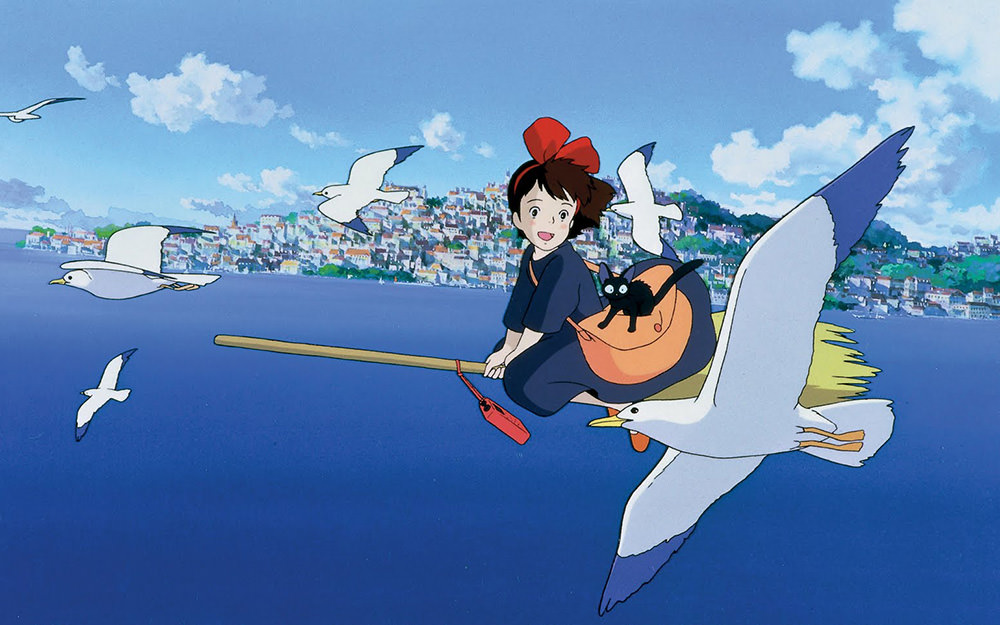Kiki’s Delivery Service by Hayao Miyazaki (Review)

Kiki is like most 13 year old girls, except for one small thing; she’s a witch. And according to tradition, every witch must leave their home upon turning 13 and travel to another city to complete their training. That’s the background to this often-charming story of self-discovery and wonder, expertly crafted by Hayao Miyazaki (considered to be the “Walt Disney of Japan”). The movie follows Kiki as she strives to establish herself in a new home and discover what it is, exactly, that makes her special.
Although released in US by Disney, and billed as a “children’s film,” Kiki’s Delivery Service rises above the mindless dross that is often associated with that particular genre. Much of this is due to Miyazaki, who realizes that children don’t need to be entertained as drones, but rather, should be encouraged to wonder and dream. Children have their own set of difficulties, and Miyazaki realizes that. We watch Kiki begin to deal with a whole new set of problems, the least of which is trying to find friends in her new home.
After receiving a less-than-warm welcome by the citizens, she runs into Osono, a woman who runs the local bakery and begins to look after the energetic and precocious Kiki. She soon gains the attention of Tombo, a young lad who dreams of flying and develops a crush on the young witch. She also meets Ursula, an artist who acts as a sort of big sister/mentor to Kiki. Kiki’s only other companion is Jiji, her black cat, who acts as Kiki’s conscience and provides much of the comic relief in the film. Like all children at this stage in life, Kiki soon develops doubts and anxieties, and must soon face the prospect that she might be losing her magical powers.
It’s easy to look at this movie and see a grand metaphor for the changes and trials one must face as they pass from childhood to adulthood, but that undermines the fact that this film is a real joy (or guilty pleasure) to watch. Kiki’s Delivery Service never devolves to a childish, juvenile comedy, nor does it become overly melodramatic and pretentious. To be sure, many adults might see the film as childish, partially due to it being a cartoon, but I think a close viewing will reveal the tender and charming feel this film carries with it.
Animation-wise, the film is superb. The detail is incredible, especially in light of modern animated films where the computer does much of the work. The colors are vibrant and motions are smooth, adding to the natural, relaxed pace of the film. The film’s setting, a seaside city that looks like a picture-perfect European resort town out of the 20s, adds to the dreamlike feel of the film.
I only have two complaints with the film. First of all, the dubbing, done with several big name actors, gets pretty bad at some points. Kirsten Dunst does an alright job as Kiki, but her delivery often sounds forced. The late Phil Hartman (to whom the film is dedicated) does a great job, though, as Jiji. The second complaint is that the storyline does seem lacking in certain places, especially as Kiki faces the loss of her powers. It’s as if Miyazaki was afraid to get too dark and uncertain, in light of the whimsical nature of the story earlier on. Certain points seemed underdeveloped to me, but that could be due to the English translation.
However, these two complaints are very minor when compared to the enjoyment I got out of watching this picture. On the tape that I rented, there were several trailers for a few other Disney releases, and I was struck at the difference between Kiki’s Delivery Service and those trailers. Unlike your ordinary “children’s” fare, which would pander to it’s target audience’s lowest common denominator with inane song-and-dance numbers and stupid slapstick humor, Kiki’s Delivery Service actually delivers a thoughtful story without too many saccharine moments. That, combined with a sense of wonder and nostalgia, as well as characters that are actually worth caring about, makes this a film that I’d much rather show to children than anything else currently being marketed to them.
